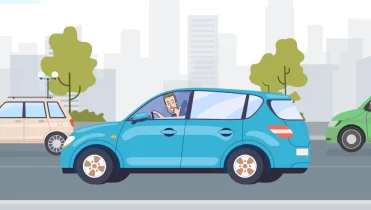less than
2 mins
- Home
- Personal Finance
- Guide
- Average Cost of Car Insurance
What is the Average Cost of Car Insurance?
The average cost of comprehensive car insurance in Australia varies widely, ranging from about $800 for Compulsory Third Party (CTP) cover to over $3,000 for specialised, modified high-end vehicles. This cost is influenced by multiple factors that insurers consider when assessing the risk associated with insuring your vehicle, and those who drive it.
GET A QUICK QUOTEShopping around and comparing different insurance providers can significantly reduce your premium.
Factors affecting your car insurance premiums:
The average cost of insurance for a car is calculated from several variables. When it comes to your specific policy, insurers have to work out the level of risk involved in covering your vehicle, and the drivers who will use it. The average cost of car insurance for new drivers costs around $2,500 per year. Age is an important factor when your insurer calculates your premium. See below:
Average cost of car insurance in Australia by age:
Age | Average annual premium |
|---|---|
20 | $2,387 |
30 | $1,293 |
40 | $1,116 |
50 | $1,010 |
60 | $899 |
Source: statista.com (2023)
GET A QUICK QUOTELearn more about car insurance with these guides
Here are some of the other major factors insurers use to determine your premium:
Level of cover: The average cost of comprehensive car insurance is generally more expensive than third-party policies, due to the broader cover provided. Optional extras like roadside assistance can also increase your premium.
Drivers’ ages and genders: As discussed above, younger drivers, particularly those under 25, pay higher premiums. Male drivers in this age group typically face higher premiums than females due to higher incidences of male driver fatalities. It’s important to decide which drivers in your household you actually need to include on your policy. If younger drivers do use your vehicle, they ought to be covered - but this will impact your premium.
Your vehicle characteristics: Insurers consider the age, make, model, security features, and modifications of your vehicle. Higher-risk vehicles that are more likely to be involved in accidents or stolen, or those that are costly to repair, will attract higher premiums. This may include Electric Vehicles (EVs), due to the difficulties in finding specialised repairers, though these restrictions may ease as these cars grow in popularity.
Your personal driving habits - and that of any other drivers covered by your policy: The more you drive, the higher the risk of accidents and wear and tear, which can increase your car premiums. Commercial use of your vehicle can also affect the cost of your premium. If you drive infrequently, consider pay-as-you-drive insurance.
Your excess amount: Choosing a higher excess can reduce your premiums, but it means higher out-of-pocket costs when making a claim.
Driving record: Experienced drivers with clean driving records and no recent claims may receive lower premiums through no-claim bonuses or good driver discounts.
Insurance provider: Premiums vary significantly between providers, so it's helpful for you to compare insurers. Ensure the level of cover is comparable across different policies to avoid paying less for reduced protection that you might actually need.
Location: Living in areas with high crime rates or at a higher risk of extreme weather can lead to higher premiums. Secure parking arrangements can help reduce these costs. The state you live in also affects how much you have to pay to keep your car on the road. For example:
Average cost of car insurance by state:
State | Average annual premium | Average cost per month for 1 person |
|---|---|---|
VIC | $1,721 | $125 |
NSW | $1,698 | $142 |
QLD | $1,274 | $108 |
WA | $1,242 | $106 |
SA | $1,233 | $103 |
TAS | $1,128 | $96 |
Source: statista.com (2023)
GET A QUICK QUOTEIf you feel your car insurance premiums are too high, consider these tips to help reduce costs:
Shop around: Don't auto-renew your policy without checking for better deals from other providers - or use a comparison website to do this for you.
Look online: Some insurers offer discounts for policies purchased online.
Increase your excess: This can lower your premiums but remember to budget for higher costs in case of a claim.
Pay annually instead of monthly: Paying your full year’s premium upfront can sometimes result in a discount.
Improve vehicle security: Adding security features to your car can lower your insurance premiums.
Safe driving: Maintaining a clean driving record can help avoid premium increases.
Review your cover annually: Do you need all the same people on your policy? If your kids have their own cars now, make sure you’re not paying twice (unless, of course, they still drive your car anyway).
Car insurance is an unavoidable expense for most Australian households, but understanding the factors that influence car insurance premiums and taking steps to compare and adjust your policy can lead to significant savings.
By considering your level of cover, driving habits, vehicle characteristics, and other personal factors, you can find a policy that offers the best value and protection for your needs.
What's new in car insurance - Feb 2025
Cheaper cover: A few providers have slashed prices for comprehensive policies.
EV insurance: Cover options are expanding as more Aussies go electric.
Tech-driven savings: Telematics are driving discounts for safer drivers.
Sources:
https://www.paintandpanel.com.au/news/news/car-insurance-has-risen-47-since-2018
https://www.forbes.com/advisor/au/car-insurance/best-third-party-car-insurance-for-australians/
https://moneysmart.gov.au/car-insurance/choosing-car-insurance
https://www.apra.gov.au/quarterly-general-insurance-performance-statistics
https://www.whichcar.com.au/advice/why-your-car-insurance-premium-is-going-up
https://www.sa.gov.au/topics/driving-and-transport/registration/vehicle-insurance
https://www.creditone.com.au/news/2069/factors-that-impact-car-insurance-costs
https://www.ibisworld.com/au/industry/car-insurance/4122/
https://auspost.com.au/car-insurance
https://www.drive.com.au/caradvice/why-has-car-insurance-gone-up-so-much/
https://insuranceasia.com/insurance/news/it-costs-47-more-australians-pay-their-car-insurance-premiums-versus-five-years-ago
Things You Should Know
Compare Club Car Insurance is an online financial comparison service and is owned and operated by Compare Club Australia Pty Ltd (ACN 634 600 007). Compare Club does not compare all brands or all products offered by all brands.
The financial products compared on this website do not necessarily compare all features that may be relevant to you. Please check with a financial professional before you make any major financial decisions.
Any advice given here is general and has been prepared without considering your current objectives, financial situation or needs. Therefore, before acting on this advice, you should consider the appropriateness of the advice having regard to those objectives, situation or needs.
You should consider the insurers PDS prior to making the decision to purchase their product. For more information please read our Financial Services Guide (FSG) which contains further information about how our service works and how we make money.
Paul Coughran is the General Manager of Emerging Verticals at Compare Club. Paul has over 20 years of experience across a wide range of industries including Banking and Finance, Telecommunications and Energy. Paul leads a team of trusted experts dedicated to helping individuals make informed decisions about their insurance and utilities needs.

Meet our car insurance expert, Paul Coughran
Paul's top car insurance tips:
- 1
Regularly compare your insurance policies – You could be paying for cover you don’t need. Shopping around every so often can save you a fair bit, maybe even hundreds each year.
- 2
Don’t just look at the premium—check the excess too. While a higher excess might bring down your premium, remember you’ll have to fork out more if you do need to claim.
- 3
Double-check what’s included in your policy. Extras like windscreen cover or roadside assistance might not be part of the deal and could cost you more.
- 4
If you don’t drive much, consider usage-based insurance. Some policies base your cost on how much you actually drive, if you work from home or only use your car for short trips this might be a much better option.



